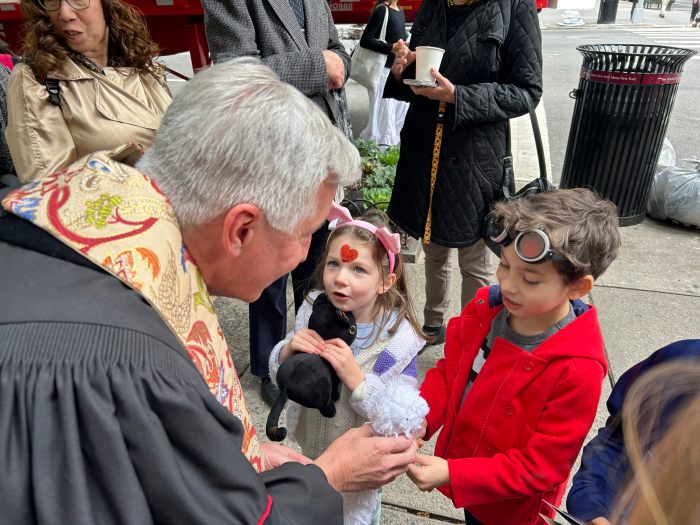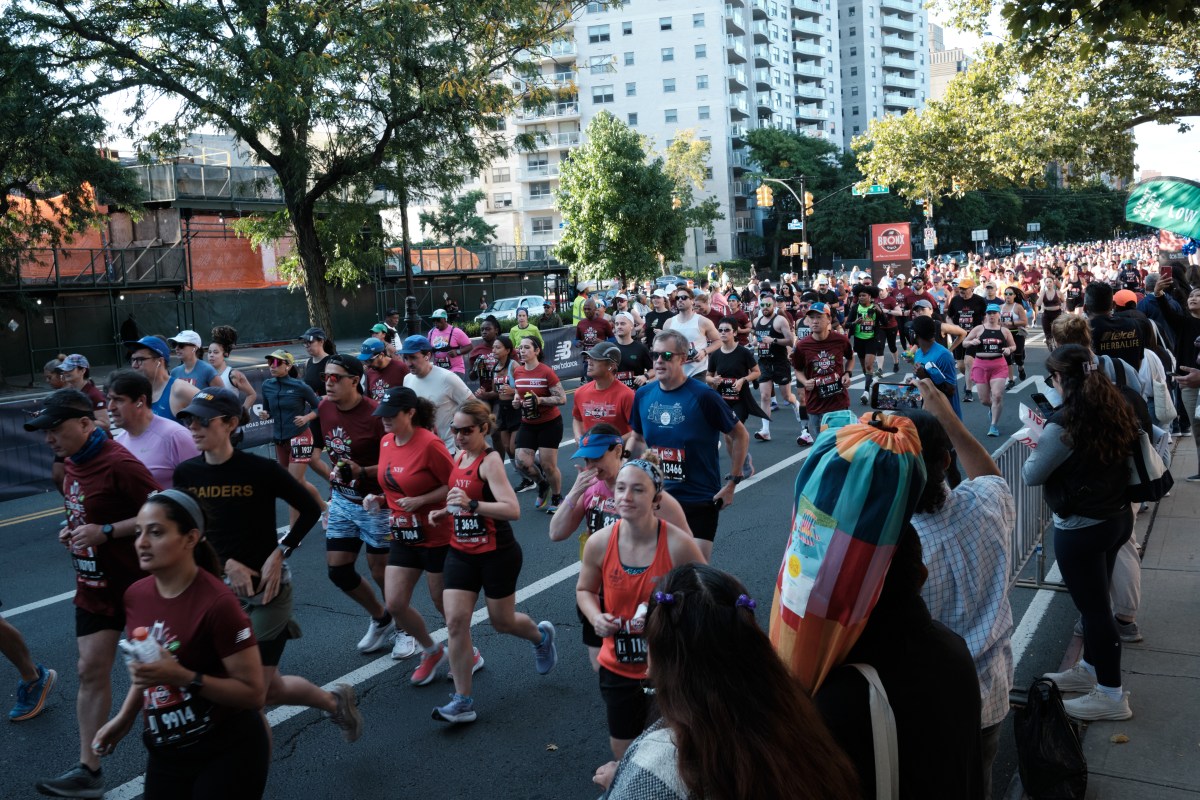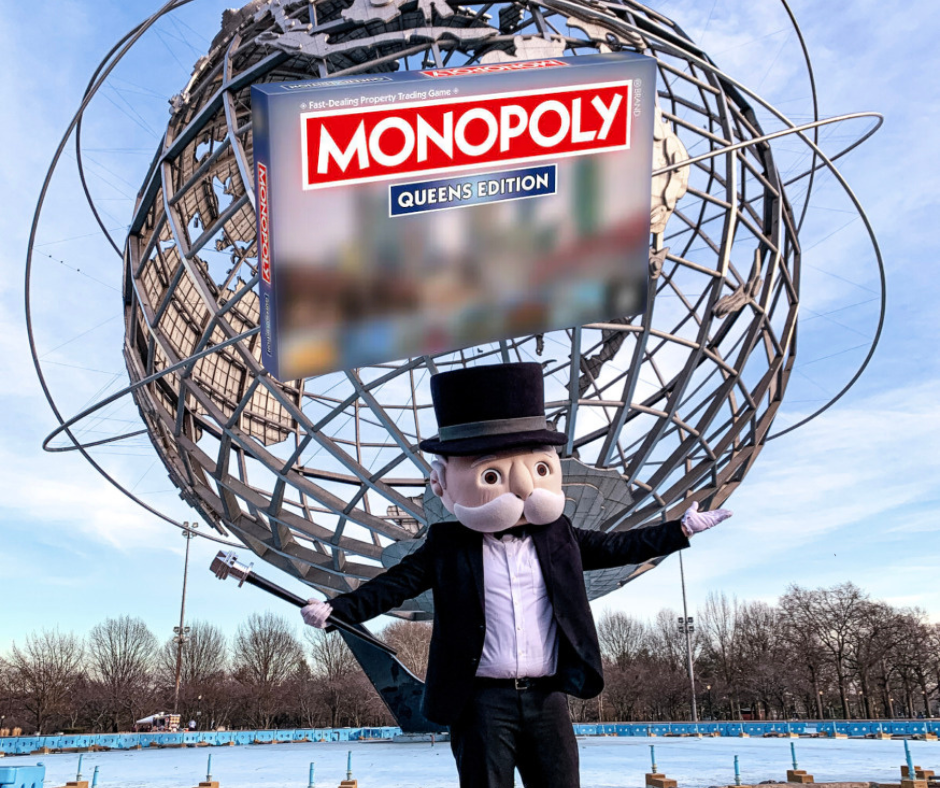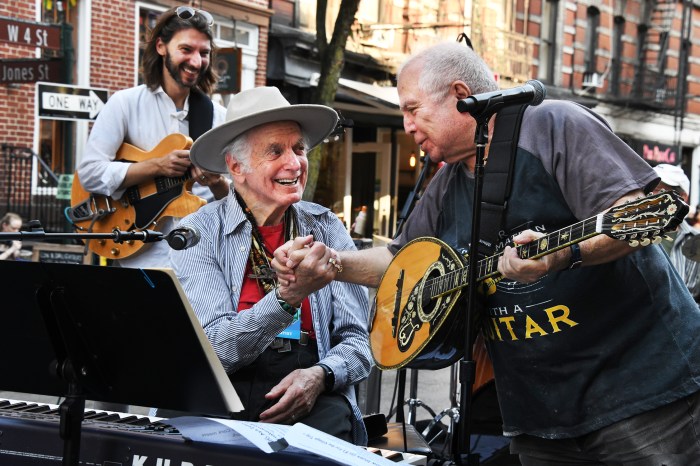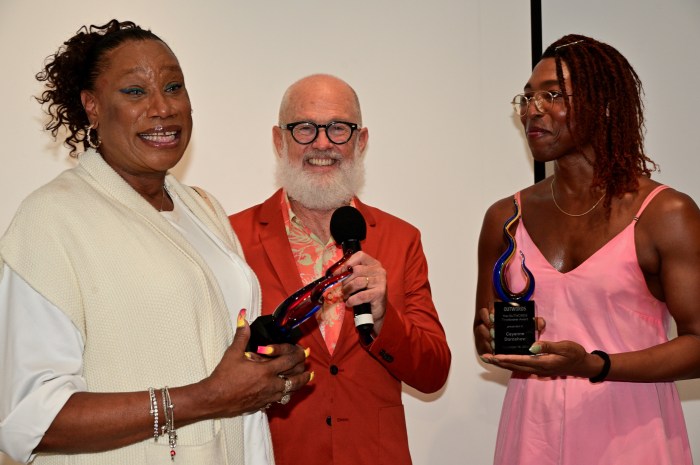By Lesley Sussman
Mo better booze-
free, C.B. 3 says,
in stinging rebuke
They probably won’t be playing any tunes at 34 Avenue A anytime soon — that is, not unless it’s alcohol-free. Community Board 3 on Tues., June 28, emphatically opposed the planned experimental music venue by refusing to support the establishment’s long-sought application for a liquor license.
At a contentious, tension-filled meeting, supporters and opponents of the proposed music venue packed P.S. 20, at 166 Essex St. Sometimes angrily voicing their opinions, board members overwhelmingly rejected appeals by the location’s co-owners Phil Hartman and Todd Patrick to allow them to operate a Pacific Coast-style Mexican restaurant and lounge in the former Mo Pitkin’s House of Satisfaction space.
The Piney Woods, as the new establishment was to be called, would have featured “avant-experimental music” in the vein of the original Knitting Factory that was located on East Houston St. before it moved to Tribeca.
Several board members said that while they were in favor of a music venue that featured experimental music and not the usual indie-rock club, dance club or punk-rock club kind of performances that typify many East Village lounges, they did not feel it was necessary for alcohol to be served there.
“This vote has nothing to do with the arts,” said C.B. 3 member Herman Hewitt. “This is not an art space or public venue. It’s a bar.”
“There’s no license there now and we don’t need to create another liquor license,” added fellow board member David Crane.
Speaking in support of the proposed establishment was board member Harvey
Epstein, who said the owners of The Piney Woods were concerned about the neighborhood and would make good tenants.
“I live on Avenue A and this is a personal issue for me,” he said. “But Phil Hartman is committed to this neighborhood and the arts. Let’s trust him to do the right thing and license it.”
Some residents earlier had criticized Hartman for allowing Aces & Eights, a raucous late-night bar that drew hundreds of neighborhood complaints and finally closed down, to take over his Mo Pitkin’s space.
“Yes, that was a bad decision,” Epstein responded to those charges, “but let’s not punish good community residents for making one bad choice.”
Hartman, founder of the popular Two Boots pizzeria chain and the annual Howl Festival of East Village Arts, was not able to attend the meeting. But in a written statement read by his attorney, the restaurateur said he “regretted” allowing Aces & Eights to have opened at his former Mo Pitkin’s locations and “causing a terrible strain on the neighborhood.”
“My involvement with The Piney Woods began several months ago when a group led by Todd Patrick asked for my help in getting the old Mo Pitkin’s space open,” Hartman added. “They had amazing credentials — Todd being a renowned concert promoter and arts events curator — and I felt that they were exactly the kind of people that the East Village should be wooing… .”
During the stormy public session of the more-than-three-hour meeting, supporters and opponents of the liquor license application aired their views. When supporters spoke, opponents of the proposed establishment held up yellow placards that read: “No New License for 34 Avenue A. Mo Pitkin’s Didn’t Work, Aces & Eights a Nightmare. Please, Not Again.”
Bob Kreizel, a photographer and local resident, told the board members, “We have endured many years of noise on Avenue A. If these people want an art space they can do so without serving liquor.”
He was joined by Tamara Sandy, a 30-year East Village resident, who said, “We don’t need alcohol to enjoy the arts. This will add more chaos — not culture — to the neighborhood.”
Speaking out in support of the proposed music venue was local resident Ann Shields.
“We’re confident about their intentions and we welcome culture back to the neighborhood,” she stated.
Also in support of The Piney Woods was local Web show host Elliot Aronow, who said that while he was “repulsed by frat boys getting drunk in the neighborhood, this would be an underground, interesting music venue and not a rock club.”
Three hours into the meeting, when a vote on the issue was finally taken, board members voted 28 to 7 to oppose the liquor license application. Patrick, who attended the meeting, looked grim as the vote was decided and declined to comment.
Although the community board’s recommendations are advisory only, the State Liquor Authority does weigh them when ultimately making the decision on whether to grant a liquor license.
But it sounds like the applicants are moving on: A source close to Hartman and Todd said that while they were disappointed, C.B. 3’s vote was expected and that another location in the neighborhood would now be sought.
In other C.B. 3 business, the board approved the co-naming for one block of St. Mark’s Place between First Ave. and Avenue A as Sara Curry Way to honor the founder of the Little Missionary Day Nursery. Curry, in 1896, opened the nursery to provide childcare for the working parents of the Lower East Side.
Board members also supported a request by the Theater for the New City on First Ave. and 10th St. for capital funding to renovate its air-conditioning systems for two of its four theater spaces. The performance venue was founded in 1971 and is one of the city’s leading Off Off Broadway theaters.
C.B. 3 members also heard from Robert Sisko, vice president of the Anshe Mezeritch synagogue’s board of directors, who said the house of worship, at 415 E. Sixth St., was “opposed to the wholesale landmarking of the entire neighborhood.”
He said designating the 101-year-old synagogue as a historic landmark would “inhibit our growth and functioning and raise the cost of operating our building.”
The city’s Landmarks Preservation Commission is considering an East Village Historic District centered on Second Ave. that includes the renowned Pyramid Club on Avenue A near E. Sixth St. and the Russian Orthodox Cathedral on E. Second St., which has also expressed its opposition to the plan.









